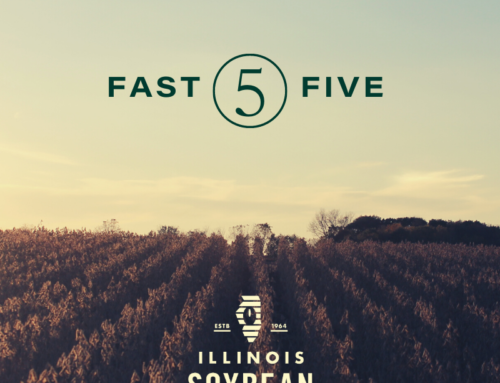FOR IMMEDIATE RELEASE
CHICAGO, ILL. – February 5, 2020 – The Illinois Soybean Association (ISA) checkoff program recently hosted nearly 50 attendees to engage with industry experts around climate variability. The summit explored data around the shifting climate in Illinois over the last century, what this could mean for the future, what different industries are doing and what agriculture can do.
“Critical conversations like this help us better understand and respond to topics affecting our industry and help us remain a leader on behalf of soybean farmers throughout the state,” said Doug Schroeder, chairman of the ISA and farmer from Mahomet. “Today, we looked at how agriculture can show up and be part of the conversation. We know agriculture is part of the solution, not the problem.”
Jim Angel, retired Illinois state climatologist, shared data showing the changes climatologists have seen over the last century. In Illinois, there has been a 1.2 degree Fahrenheit increase in surface temperatures since 1895 with projections for an average of another 5 to 9 degree Fahrenheit increase by the end of this century. Looking forward, Angel sees the Midwest becoming warmer and experiencing more frequent and heavier rain events. In addition, 2020 is shaping up to be another wet year.
When questioned what the biggest contributor to carbon dioxide in the atmosphere is and the best solution, Angel stated, “There’s no one single contributor when it comes to carbon dioxide emissions. Each industry has the opportunity to decrease its carbon footprint, but agriculture has the unique opportunity to take some away. Carbon dioxide can be put back into the soil through organic matter.”
Jill Wheeler, head of sustainable productivity in North America at Syngenta, sees a growing focus on climate smart agriculture, momentum toward an ecosystem services market and corporate commitments. “We need to integrate and bridge the gap between industry and producers,” Wheeler said. “Industries have started to make sustainability commitments, but we need to make sure we can meet those commitments first. Farmers are an important part of finding this solution, and we need to make sure they are a part of the conversation.”
Pipa Elias, director of agriculture for North America at The Nature Conservancy (TNC), works with corporations, policymakers and other stakeholders to combat climate change from the ground up. Elias is working to open up conversations within the supply chain that lead to collaborative solutions.
“There are two paths,” Elias stated. “We continue what we are doing, or we partner with each other to create a better future. We are all part of the solution. The power is in our hands right now, but we may not have these opportunities in the future.”
Both Syngenta and TNC are members of the Ecosystem Services Market Consortium, an initiative working to create a market-based approach to improve soil health systems that benefit growers financially and deliver environmental benefits to society as a whole. According to TNC, farmers have the potential to benefit significantly from this approach. Cover crops can sequester about 0.13 tons of carbon per acre. At a payment of $10 per ton, that’s $160 million back in farmers’ pockets across 122 million acres of cropland in the Corn Belt.
“Many people do not think of agriculture when talking about corporate climate goals,” said Elias. “We need to give growers access to knowledge and resources to successfully adopt conservation practices while also benefitting from the market. The only way this system works is if growers make money.”
“Now is the time to have these conversations, when there is a willingness from all parties to come to the table,” stated Jayma Appleby, director of industry relations for the ISA. “We need to engage, rather than educate. Who are the partners we need to work with to be successful in this endeavor? It has to be more than just agriculture with skin in the game. We also need to make sure solutions are profitable for all involved.”
The ISA checkoff and membership programs represent more than 43,000 soybean farmers in Illinois. The checkoff funds market development, soybean production and profitability research, issues management analysis, communications and education. Membership and advocacy efforts support Illinois soybean farmers’ interests in local areas, Springfield and Washington, D.C., through the Illinois Soybean Growers. ISA programs are designed to ensure Illinois soy is the highest quality, most dependable, sustainable and competitive in the global marketplace. For more information, visit ilsoy.org.
-30-
For more information, contact:
Rachel Peabody
peabodyr@ilsoy.org
217-825-7654
Maggie Smith
msmith@flmharvest.com
651-246-6666

